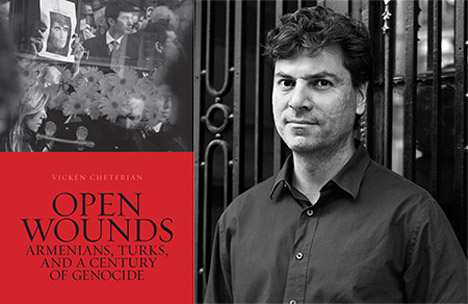Open Wounds: Armenians, Turks and a Century of Genocide
- (0)
Open Wounds: Armenians, Turks and a Century of Genocide –

Open Wounds: Armenians, Turks and a Century of Genocide
By Vicken Cheterian
A probing reflection on how silence and complicity in the face of mass violence affects a society for decades.
Description
The assassination in Istanbul in 2007 of the author Hrant Dink, a high-profile advocate of Turkish–Armenian reconciliation, reignited the debate in Turkey on the annihilation of the Ottoman Armenians. Many Turks subsequently re-awakened to their Armenian heritage, reflecting on how their grandparents were forcibly Islamised and Turkified, and the suffering they endured to keep their stories secret. There was public debate around Armenian property confiscated by the Turkish state and the extermination of the minorities. At last the silence had been broken.
After the First World War, the new Turkish Republic forcibly erased the memory of the atrocities, and traces of Armenians, from their historic lands—a process to which the international community turned a blind eye. The price for this amnesia was, Cheterian argues, ‘a century of genocide’.
Turkish intellectuals acknowledge the price society must pay collectively to forget such traumatic events, and that Turkey cannot solve its recurrent conflicts with its minorities—like the Kurds today—nor have an open and democratic society without addressing the original sin on which the state was founded: the Armenian Genocide.
Reviews
‘In this extraordinary and beautifully-written book, Cheterian tells us the little known story of the aftermath of the Armenian Genocide of 1915. He reaches into the history and present-day politics of Armenians and Turks to tell a story and provide explanations that have been neglected or elided by others. There is no other text like this.’
— Ronald G. Suny, Professor Emeritus of Political Science and History, University of Chicago and former chairman of the Society for Armenian Studies
‘This is an important book about the distortion of history in the service of realpolitik. It demonstrates, cooly and clinically, how the desire of Western nations to keep Turkey “on side” has produced official amnesia about the Ottoman Empire’s attempted destruction of the Armenian race. Cheterian’s fair and finely written reflections on Armenia’s neuralgic need for justice, and the pathological inability of a modern Turkey to face the facts of its past, ends with hope that it may do so – although not soon. This book makes an important contribution to the healing of old wounds.’
— Geoffrey Robertson QC, human rights barrister, Doughty Street Chambers and author of An Inconvenient Genocide: Who Now Remembers the Armenians?
The Author
Vicken Cheterian is a historian and journalist, and is currently based at Webster University, Geneva.


















